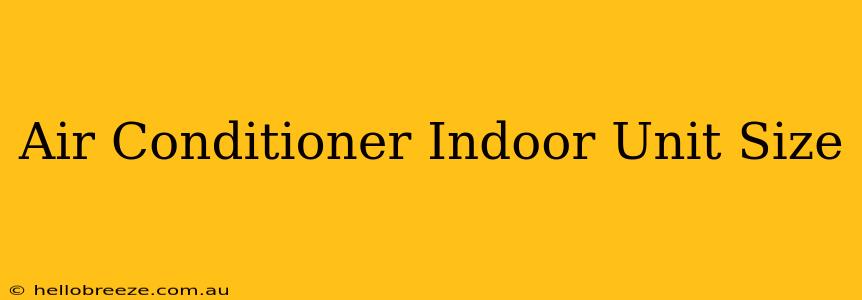Choosing the right air conditioner can be tricky, and a crucial part of that process is understanding air conditioner indoor unit size. Getting it wrong can lead to inefficient cooling, uncomfortable temperatures, or even damage to your unit. This comprehensive guide will walk you through everything you need to know to select the perfect indoor unit size for your needs.
Understanding BTU and Its Relation to Indoor Unit Size
The key factor determining the size of your indoor unit is BTU (British Thermal Units). BTUs measure the cooling capacity of an air conditioner. A higher BTU rating means more cooling power. However, simply choosing the highest BTU rating isn't the best approach. An oversized unit will cool your space too quickly, leading to:
- Inconsistent temperatures: The unit cycles on and off frequently, never reaching optimal temperature stability.
- Increased humidity: Shorter run times prevent proper dehumidification.
- Higher energy bills: Constant on/off cycles waste energy.
- Reduced lifespan: The frequent cycling puts extra strain on the compressor, shortening its lifespan.
Conversely, an undersized unit will struggle to cool your space adequately, resulting in:
- Poor cooling performance: Your space will remain uncomfortably warm.
- Increased energy consumption: The unit will run constantly trying to catch up.
- Potential for system failure: Overworking the unit can lead to premature breakdowns.
How to Determine the Right BTU for Your Space
Calculating the correct BTU requires considering several factors:
- Square footage: The larger the room, the higher the BTU requirement.
- Ceiling height: Higher ceilings require more cooling power.
- Number of windows and their size: Larger windows and direct sunlight increase the heat load.
- Insulation: Well-insulated homes require fewer BTUs.
- Climate: Hotter climates necessitate higher BTU ratings.
- Number of occupants and appliances: People and appliances generate heat.
Many online calculators can help estimate your BTU needs based on these factors. However, it's always best to consult with a qualified HVAC professional for an accurate assessment. They can take into account specific aspects of your home and recommend the optimal BTU and corresponding air conditioner indoor unit size.
Types of Indoor Units and Their Sizes
Air conditioner indoor units come in various types, each with its own size considerations:
- Wall-mounted units: These are the most common type, ranging in size from compact units suitable for small rooms to larger models for spacious areas. The size is largely determined by the BTU rating.
- Window units: These are generally smaller and more suitable for individual rooms. Again, BTU rating is the primary factor in determining the appropriate size.
- Cassette units: These are often larger and are usually installed in ceilings, providing discreet cooling for larger spaces. Their size is determined by the required cooling capacity and the layout of the ceiling.
- Floor-standing units: These can be quite large and are often used in larger commercial spaces. Their size is typically dictated by the cooling capacity needed.
- Ducted systems: These systems use a network of ducts to distribute cooled air. The size of the indoor unit (air handler) is directly related to the size of the space being cooled.
Factors Affecting Indoor Unit Size Beyond BTU
While BTU is the primary determinant, other factors also play a role in the air conditioner indoor unit size:
- Airflow: The unit's airflow capacity impacts its ability to effectively cool the space. A higher airflow rate is generally better for larger rooms.
- Dimensions: Even with the correct BTU rating, the physical dimensions of the unit must be appropriate for your space and installation location. Measure your space carefully before making a purchase.
- Aesthetics: The overall look of the indoor unit should complement your interior design. Consider the unit's color, shape, and finish.
Conclusion: Professional Guidance is Key
Selecting the correct air conditioner indoor unit size is vital for optimal cooling performance and energy efficiency. While online tools can offer estimates, the best approach is to consult with a qualified HVAC professional. They can perform a thorough assessment of your home, considering all relevant factors to ensure you choose the perfect unit for your comfort and budget. Don't hesitate to ask questions and get multiple quotes to find the best solution for your needs.

